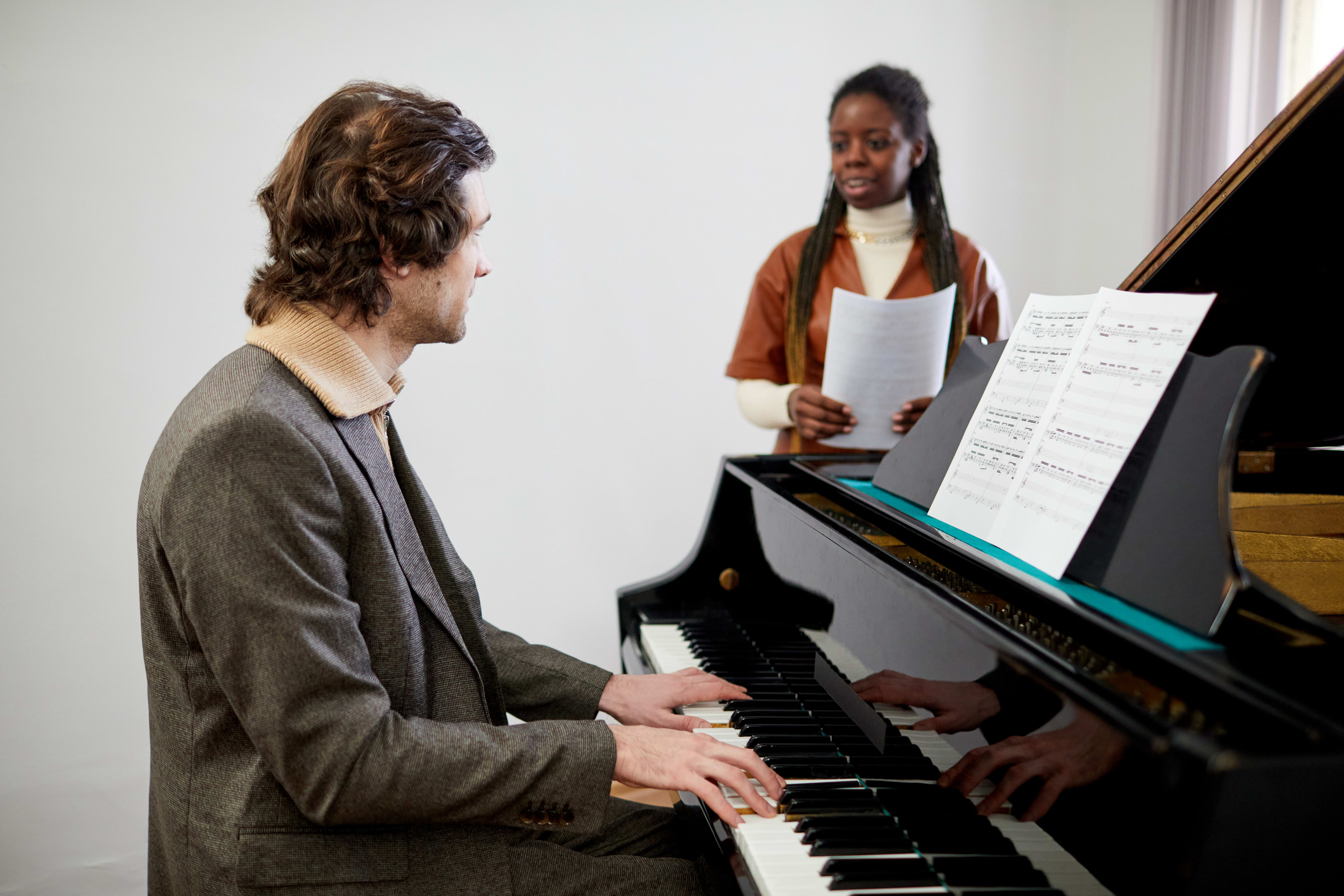What Can You Do With a Music Degree?

Key Takeaways
- Earning a music degree can open career opportunities in fields such as public relations, teaching, sound engineering, and management.
- Diverse jobs for music majors include actors, public relations assistants, and theater managers, among others.
- Success in the music industry requires dedication, versatility, and strong networking skills.
A music degree cultivates a unique blend of creativity, critical thinking, and communication skills valued across industries. From engineering cutting-edge music technology to managing world-renowned artists and venues, the opportunities beyond the stage offer new ways to apply your musical passion. Read on to explore the diverse, vibrant career paths you can pursue with the knowledge gained from your music program.
What can you do with a music degree?
With a music degree, you can work as a solo performer or member of an ensemble in the music industry, teach music in private or educational settings, produce music, write music for movies, television shows, and video games, manage musicians, and have positions in sound engineering or music therapy.
The fact is that there are tons of career options available for you as a music degree holder; however, writing, performing, and instructing are three major aspects of this career.
According to the US Bureau of Labor Statistics, the median hourly income for instrumentalists and singers in the United States in May 2020 was $31.40.

Back to Top
Best Jobs for Music Majors
There are diverse jobs for music majors; let’s explore some.
Actors
Actors work in television studios, theme parks, theater groups, and film productions, performing specialized music, cinema, and theater roles.
Accurately bringing a character to life and entertaining the public requires script reading, interpretation, and memorization skills, all valuable skills learned in music school. Plus, if you’re auditioning for a role where singing or playing an instrument is required (or a bonus), your training in school will come into play.
Actors make, on average, $42,214 a year across the country.
Public Relations Assistant
A public relations assistant in PR firms works with PR specialists and other media experts to implement successful PR campaigns for their clients.
Public relations assistants may be assigned to handle client greetings, phone support, campaign scheduling, and many other activities. However, a music degree will make you stand out when applying for this position, especially if your promoting activity involves music, theaters, cinemas, entertainment, and similar ones.
The average yearly wage across the country for public relations assistants is $48,007.
Theatre Manager
A theater manager is responsible for supervising the daily activities of the theater and guaranteeing seamless shows and effective venue management. Managing personnel, scheduling, finances, and communication with production teams are among the duties.
Graduating from a music school is a strong plus when applying for these job positions because it shows that you have a deep understanding and care for the content produced in the theater, aside from the financial aspect.
A master’s degree in theater arts management is usually a plus for this profession. The annual average salary of theater managers nationwide stands at $45,818.
Disc Jockey
A disc jockey, sometimes known as a DJ, selects and plays music for various occasions, including radio broadcasts, clubs, and parties. They deftly mix music, make smooth transitions, and sense the crowd’s mood to guarantee a lively atmosphere.
With an average yearly remuneration of $54,131, music graduates often find the DJ career among the most remunerating ones, especially if they focus their studies on modern and electronic music.

Musician
Graduating from a music school and becoming a musician is the most natural path. Performing this profession, you can showcase all the genres and instruments you learned to play during your school years.
The average wage for this profession is $44,350 per year. Musicians could perform together in an orchestra, band, or recording studio or accompany other musicians on tour with other performers or theater companies.
An online music education master’s degree could also open up career opportunities for those who want to teach music.
Back to TopTypes of Music Schools and Programs
In the music environment, what you can do with your music degree greatly depends on the type of degree that you achieve or that you would like to achieve. Because of this, it is extremely important to consider the types of music schools and programs when considering future employment.
While the following programs are some of the best in the United States, there are many top-ranked online bachelor’s programs in music that have quality degree programs.
Julliard School of Music
The Juilliard School of Music, located in New York City’s Lincoln Center, was founded in 1905 and is widely regarded as the country’s premier music conservatory. It has a strict admissions process and alumni include musical greats Miles Davis and Yo Yo Ma. Juilliard’s tiny size ensures a concentration of top-tier talent, offering bachelor’s, master’s, and doctorate degrees.
Their offerings encompass a variety of disciplines, including musical instruments, music theory, composition, and voice and opera. The tuition range is between $67,300 and $83,000.
Curtis Institute of Music
Curtis is the nation’s most exclusive conservatory, with live auditions required and an annual admittance rate of four to 11 percent. The undergraduate population, of approximately 150 students, all get full-tuition scholarships. The school maintains an acceptance rate of 5% annually.
It offers a performance diploma, a Bachelor of Music, a Master of Music in opera, and a Professional Studies Certificate. The tuition fee begins at $19,000.
Manhattan School of Music
The Manhattan School of Music, founded in 1918, is a prominent institution in the heart of New York City. It offers different undergraduate and graduate programs in classical and jazz music. including:
- Classical Music
- Jazz Arts
- Composition
- Contemporary Performance
- Music Education
Within these programs, specific concentrations or specializations may be provided. Despite some changes that might depend on the degree choice, the tuition for this particular school starts at $50,000 per year.

Back to Top
Related Questions
Is a music degree worth it?
Chasing a music degree is invaluable for enthusiasts, opening doors in performance, education, and various industry roles. This educational journey establishes a strong foundation, paving the way for a satisfying and successful career in the music niche. Yet it’s crucial to identify a specific focus for a well-rounded pursuit.
Can I make a career in music?
Yes, a career in music is achievable. Opportunities exist in performance, teaching, composition, production, and other music-related fields. Success often requires dedication, versatility, and networking to navigate the dynamic music industry. So, the decision is entirely in your hands.
Often, to be eligible for promotion to positions with more responsibility and a higher level of pay, an advanced degree may be required. If you are interested in a master’s degree, but concerned about the cost, there are affordable online master’s degree programs in music.
Is music a difficult degree?
Yes, a music degree is challenging yet rewarding. It demands commitment to honing artistic skills and meeting academic requirements. The difficulty varies based on personal aptitude and the chosen specialization, making perseverance crucial for success in this fulfilling discipline.
A music degree opens up a variety of professional options beyond performance and teaching. Graduates engage in a dynamic business in fields ranging from composition to technology and music therapy.
As the world changes, their abilities contribute to music’s transforming power, improving lives in a variety of ways. The options are as varied as the musical environment itself.